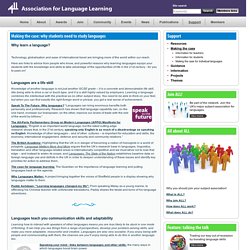

German Missions in the United Kingdom - Why learn German? Enlarge image 1: The British economy is hugely dependent on exports (© Colourbox) The British economy is hugely dependent on exports.

In Q1 2014 the UK exported 74.1% of goods, most of the exported goods and services exported go to the European Union’s single market, but 80% of all export managers are unable to conduct business in a foreign language (CILT 2006). Regarding the trade and good export market, Germany is Britain’s second most valuable partner. Thus, poor language competency results in a loss of an estimated ₤7.3bn per annum (CfBT Education Trust survey 2011). Enlarge image 2: Germany has the largest economy in Europe (© Colourbox) Germany has the largest economy in Europe and the fourth largest in the world (after the US, China and Japan) (World Bank, 2014).
It is among the largest exporting economies in the world, and of the world’s 100 biggest companies, 10 are German/Swiss, and 5 are British (Fortune Global 500, 2014). The benefits of speaking more than one language. “The limits of my language mean the limits of my world.” – Ludwig Wittgenstein Language fuels our brains, frames our thoughts and makes complex communication possible.

The words, expressions and quirks unique to our language largely define how we see and understand the world. If you’re monolingual, that world has clearer limits. But in an age of borderless communications and global travel, it seems almost archaic to be limited to one language only – even if you’re lucky enough to speak a global language like English or Spanish as your mother tongue. But is being bilingual – speaking two languages – or even multilingual all it’s cut out to be? 10 Must-Watch TED Talks for Language Learners. TED Talks are short, influential lectures from experts in science, technology, design, education, and beyond.

If you haven’t visited the TED website, you should. There’s something on there for everyone, and many lectures come with subtitles in other languages, so it’s a great language learning tool to boot! Below is a collection of 10 of our favorite TED Talks for language learners, including advice on becoming a better learner, discussions on how our languages affect us, and stories of language advocacy. Learning advice: Learning how to learn: Before getting into any specifics for language learning, you may want to improve your general learning technique.
How to speak so that people want to listen: Gmail - Free Storage and Email from Google. Making the case: why students need to study languages. Why learn a language?

Technology, globalisation and ease of international travel are bringing more of the world within our reach. Here are links to advice from people who know, and powerful reasons why learning languages equips your students with the knowledge and skills to take advantage of the opportunities of life in the 21st century - for you to pass on! Languages may be passport to Oxbridge, data suggests - BBC News. Students with good grades are more likely to win a place at Oxbridge and top universities to study languages than in recent years, data suggests.

Analysis of UK application statistics, by the Press Association, shows many top Russell Group universities have seen a sharp drop in applications for European language courses since 2010. This has led to a higher proportion of applicants being accepted. It comes amid continuing concerns about a fall in language learning. The Press Association analysis looked at applications made through the main University and College Application Service (Ucas) scheme to study European languages, literature and related courses at the 24 Russell Group universities in the UK and the number of acceptances. Would-be students may apply for more than one course. The findings show that at a number of institutions, the proportion of applications accepted has risen in the past five years. 'Marginally easier' 'High entry requirements'
European Day of Languages > Teachers > Teaching materials.
For tutors: Languages Week 2014. Easiest foreign languages: in pictures. How I quadrupled the number of pupils taking German in my school. Sara Davidson is a German teacher and head of modern languages at Oundle School, Peterborough.

While learning German is not always a popular choice among UK students, the number of sixth-formers taking it at Davidson’s school has quadrupled thanks to her efforts to promote it in the past six years. In July 2014, she won an award from the German embassy for “setting standards of excellence” in the teaching of German as a foreign language in Britain. German is the most important language in Europe. Developments in the EU and German chancellor Angela Merkel’s efforts to make the country a more prominent power have boosted interest in German among students.
Germany is the biggest exporting nation in Europe and there are many career opportunities in the country. But there’s still a cloud hanging over learning German, and promoting it is a full-time job. But pupils also need to feel confident that their teachers are good and that they will help them get the grades. What happens in the brain when you learn a language?
Learning a foreign language can increase the size of your brain.

This is what Swedish scientists discovered when they used brain scans to monitor what happens when someone learns a second language. The study is part of a growing body of research using brain imaging technologies to better understand the cognitive benefits of language learning. Tools like magnetic resonance imaging (MRI) and electrophysiology, among others, can now tell us not only whether we need knee surgery or have irregularities with our heartbeat, but reveal what is happening in our brains when we hear, understand and produce second languages. The Swedish MRI study showed that learning a foreign language has a visible effect on the brain. Young adult military recruits with a flair for languages learned Arabic, Russian or Dari intensively, while a control group of medical and cognitive science students also studied hard, but not at languages. However we learn, this recent brain-based research provides good news.